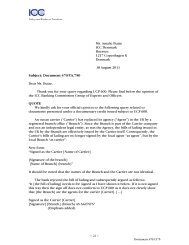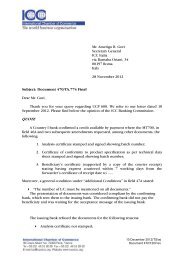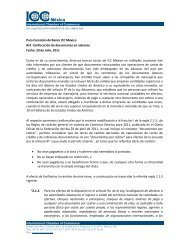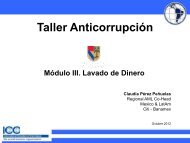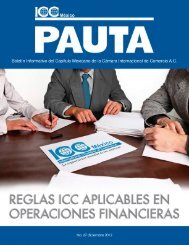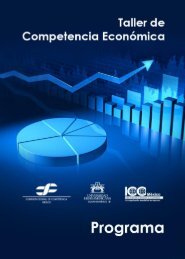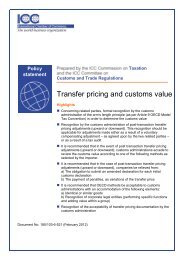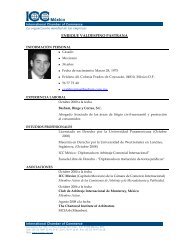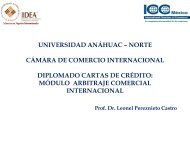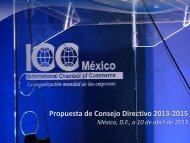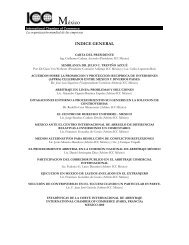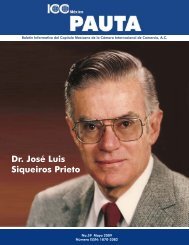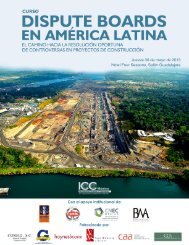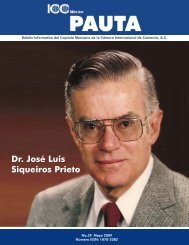Pauta 54.pdf - ICC México
Pauta 54.pdf - ICC México
Pauta 54.pdf - ICC México
- No tags were found...
Create successful ePaper yourself
Turn your PDF publications into a flip-book with our unique Google optimized e-Paper software.
Final Report on ConstructionIndustry Arbittrationsarea not within the competence of an ordinary expert or are found to require a decision between two differentschools of thought to one of which the tribunal member is favourably disposed, perhaps unconsciously as aresult of training or experience). It is therefore important that, before the tribunal appoints its own expert, theother members of the tribunal are satisfied not only that any expert member is truly independent and free fromany apparent or unconscious bias but that the issues are likely to be within his or her competence (just as thetribunal should not rely on a member who was a lawyer unless it was satisfied that the lawyer was competent inthe field in question). Obviously the tribunal must avoid the possibility that an arbitrator with a specialqualification is not unduly influential in discussions within the tribunal. (Such an arbitrator is still likely to be ofconsiderable value in helping the tribunal to understand the points at issue and to communicate with theparties and experts.) Such situations would entitle the tribunal to appoint another expert to advise it, especiallyif the parties themselves (in their written submissions or through reports from their own experts) have notprovided adequate technical information. On the other hand the appointment of an expert by the tribunal maybe justified where the assessment of part of the case might take a considerable time, e.g. the examination of acomplex network analysis. A decision of this kind should normally be discussed with the parties since, forexample, it might be thought that a member of the arbitral tribunal nominated by one of the parties ought not tosupplant a tribunal-appointed expert, although in principle no difficulties should arise if that member was trulyindependent as required by the declaration required of all nominated arbitrators. He would then be able to assisthis fellow arbitrators in understanding the technical aspects of the case and in drafting the relevant parts of theaward. However, as we have pointed out, precautions must be taken to see that the technical knowledge andviews of one of the arbitrators that may influence the tribunal have been communicated to the parties so thatthey have a proper opportunity of dealing with them by submissions or evidence.59. In construction arbitrations there can be confusion about whether or not expertise is required so it is alwaysprudent to clarify the position. It is sometimes assumed that expert evidence will be required to deal with a matterwhich another party would regard as requiring proof from documents or a witness (e.g. the quantification ofactual loss or expenditure). It is also sometimes assumed that the tribunal will appoint an expert and that a partymay only be required to consider producing an expert if dissatisfied with the tribunal's report or if further proof isrequired. The tribunal should therefore always consult the parties at the first procedural meeting as to whetherthey both are intent on tendering evidence from experts and why such expertise is required (for in reality it may bethat the proof should provided in another way and the experts are being used as advocates). In a case where theopinions of experts are important and where any differences are not attributable to different perceptions of thefacts, the tribunal's own expert may only be needed once the points of disagreement between the parties or theirexperts are clearly identified. In such circumstances the tribunal should only appoint its expert if it is necessarysince the costs of the tribunal's expert have to be borne by the parties. On the other hand in many cases weconsider that it may actually save the parties considerable time and expense if the tribunal were to appoint its ownexpert. The opinion of that expert might render unnecessary any further expertise or it may identify the pointsupon which evidence or reports from witnesses or experts may be required. It may therefore be cost-effective forthe tribunal to appoint its expert and to obtain a report first. (It would not or would not necessarily be costeffectivein the cases where the parties are likely to need an expert to assess the report of the tribunal’s expert orwhere they are determined to exercise their right to present their own expert evidence.) Any report or othercommunication with such an expert must of course also be transmitted to the parties at the same time as it is sentto the tribunal. As to timing the tribunal ought normally to decide whether it will appoint its own expert before itissues the provisional timetable under Article 18.4 since the timetable will be affected by the work of that expert. Ifthe tribunal is unable to reach that decision at that stage it will no doubt inform the parties at the proceduralmeeting and before arriving at the provisional timetable so that they can take account of the possibility that anexpert may yet be appointed by the tribunal.60. It is now common in international construction arbitrations to find that a party has from a very early stage useda consultant in the preparation of claims (quantity surveyors, claims consultants etc.). Often such consultantsPAUTA 52



